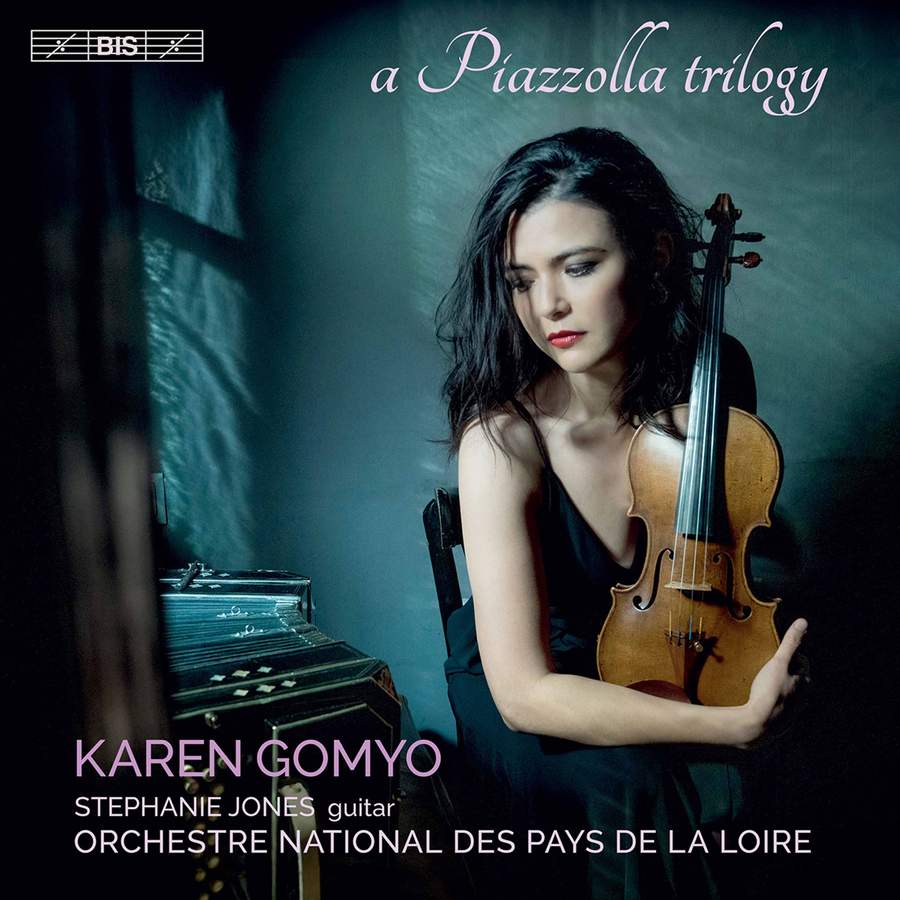Karen Gomyo: A Piazzolla Trilogy
View record and artist detailsRecord and Artist Details
Genre:
Orchestral
Label: BIS
Magazine Review Date: AW21
Media Format: Super Audio CD
Media Runtime: 63
Mastering:
DDD
Catalogue Number: BIS2385

Tracks:
| Composition | Artist Credit |
|---|---|
| (Las) Cuatro Estaciones porteñas, 'The Four Seasons' |
Astor Piazzolla, Composer
Karen Gomyo, Violin Orchestre National des Pays de la Loire |
| (6) Tango-Etudes, Movement: No 3 |
Astor Piazzolla, Composer
Karen Gomyo, Violin |
| (6) Tango-Etudes, Movement: No 4 |
Astor Piazzolla, Composer
Karen Gomyo, Violin |
| (6) Tango-Etudes, Movement: No 5 |
Astor Piazzolla, Composer
Karen Gomyo, Violin |
| Histoire du Tango |
Astor Piazzolla, Composer
Karen Gomyo, Violin Stephanie Jones, Guitar |
Author: Andrew Farach-Colton
Unlike many classical performers who enjoy a brief dalliance with Piazzolla’s music, the violinist Karen Gomyo seems to be in it for the long haul: she has been playing tango nuevo for at least a decade, and has worked with such luminaries as pianist Pablo Ziegler, linchpin of Piazzolla’s second quintet.
Gomyo’s commitment shines through in these gorgeous yet tough and rhythmically incisive interpretations. Note, for example, how she adds grit to the nostalgic interlude (starting at 2'05") in ‘Verano Porteño’ so one feels as much ache as sweetness. Or try at 0'59" in ‘Primavera Porteña’, where she makes her violin wheeze like a bandoneón, and her vertiginous phrasing brings to mind Piazzolla’s own white-hot performance style. I have mixed feelings about Leonid Desyatnikov’s arrangements (made for Gidon Kremer), largely because the peppering of Vivaldi quotations wears thin on repeating hearings, but Gomyo and the strings of the Pays de la Loire National Orchestra play them for all their worth. And special mention must be made of Paul Ben Soussan, the orchestra’s cellist, for investing his extensive solo in ‘Otoño Porteño’ with such soulful fervour.
Guitarist Stephanie Jones is quite a soulful player, too. I don’t think I’ve ever heard the opening of Histoire du Tango’s second movement, ‘Café 1930’, so thoroughly drenched in melancholy. Indeed, she and Gomyo find considerable drama in one of the composer’s most light-hearted works. Even in the breezy opening movement, ‘Bordel 1900’, their attention to expressive detail gives the music surprising emotional weight.
I only wish Gomyo had given us all six of the solo Tango Études (like Histoire originally written for flute but, to my ears, similarly preferable in its violin version – the violin being so central to tango, both nuevo and viejo). Not only is her playing remarkable for its dexterity and purity of tone but I love, too, how she really takes her time so the music unfolds with a sense of purpose. In her hands, these études are as much character studies as technical ones, and while her tempos are noticeably slower than, say, Kremer’s (Nonesuch), the result is consistently more engaging.
All in all, an intelligent and immensely satisfying celebration of Piazzolla for his centenary year – and all beautifully recorded, too.
Discover the world's largest classical music catalogue with Presto Music.

Gramophone Digital Club
- Digital Edition
- Digital Archive
- Reviews Database
- Full website access
From £8.75 / month
Subscribe
Gramophone Full Club
- Print Edition
- Digital Edition
- Digital Archive
- Reviews Database
- Full website access
From £11.00 / month
Subscribe
If you are a library, university or other organisation that would be interested in an institutional subscription to Gramophone please click here for further information.




